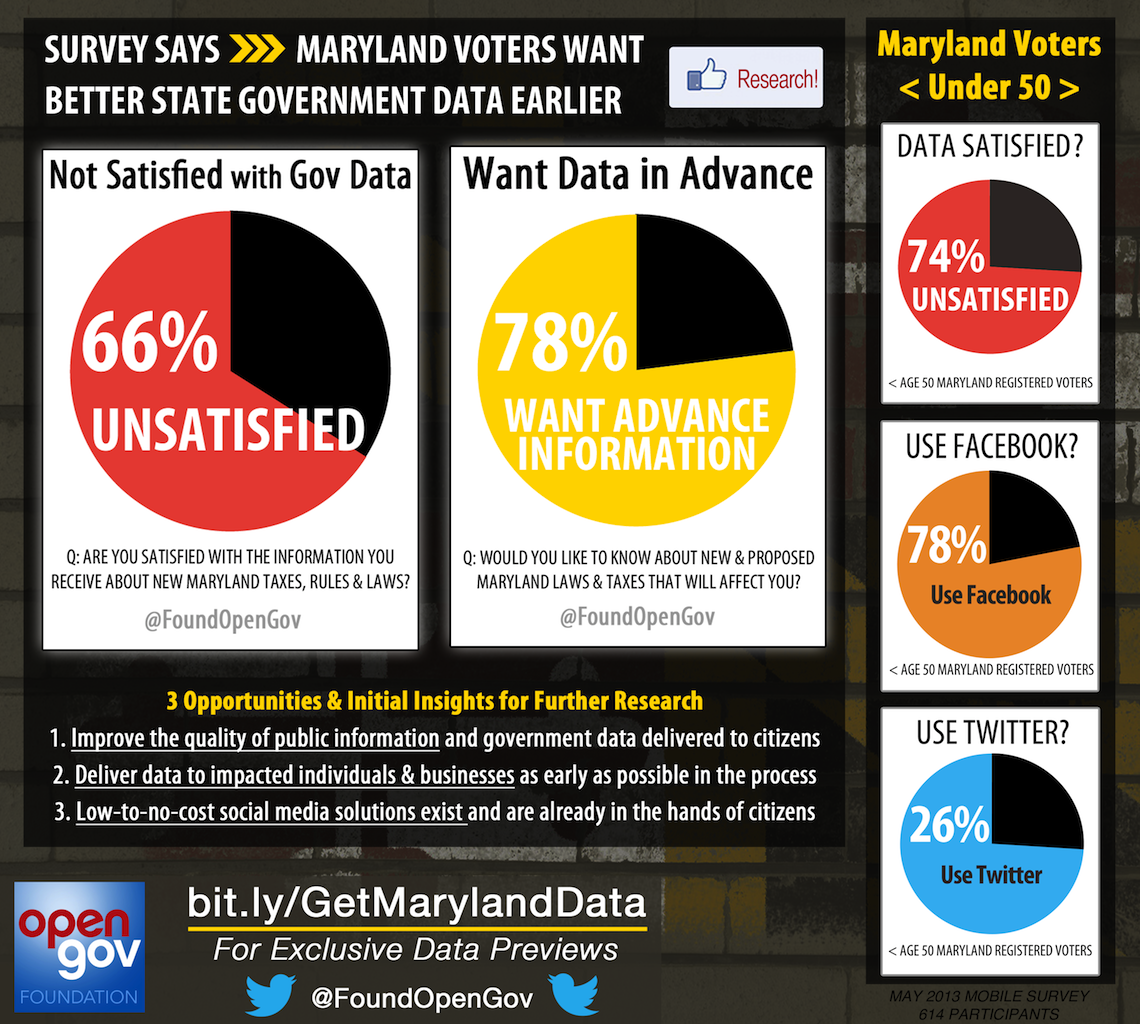By Meg Tully
 Two thirds of voters are not satisfied with the information they get about Maryland laws, regulations and taxes, according to the results of a mobile phone survey being released Thursday by the OpenGov Foundation.
Two thirds of voters are not satisfied with the information they get about Maryland laws, regulations and taxes, according to the results of a mobile phone survey being released Thursday by the OpenGov Foundation.
OpenGov, a nonpartisan, nonprofit organization focused on using technology to make public information more accessible, also found that 78% of Maryland voters want advance notification about Maryland policies that will impact them.
“I was actually surprised at how high the level of dissatisfaction was with just the quality of information people were receiving,” said Seamus Kraft, executive director at the organization.
Informal poll got 614 responses
The surveys were an informal tracking poll that is intended to help show the organization how much progress toward transparency has been made as they begin their efforts. The foundation called mobile phone numbers and got responses from 614 Marylanders who identified themselves as registered voters.
The report also includes breakout of younger voters (ages 18-49) and older voters (ages 50 and up). Those results showed 74% of younger voters are not satisfied with the information they currently receive and 77% want advance notification.
Results of the survey were mailed to Maryland legislators on July 30 and OpenGov has invited them to start a dialogue on the issue.
“I think this is a very new knowledge source for effective service and improving the job you’re doing,” Kraft said. “It’s customer feedback frankly.”
The foundation is focusing its efforts on improving transparency in Maryland and Baltimore, with the goal of creating tools and processes that can be duplicated in other U.S. communities. Making public information more accessible and interactive is a problem “really crying out for Silicon Valley problem solving abilities and execution abilities,” he said.
Large numbers of social media users provide “opportunities”
The report also focuses on how many voters use social media like Twitter and Facebook – with more than half of all voters using Facebook and 19% using Twitter. Among younger voters, those numbers go up to 78% and 26%, respectively.
Kraft said those numbers show that Maryland government can use social media tools already available without any new software development to reach voters better that won’t cost the government or voters anything to use.
“We see those numbers as opportunities” Kraft said.
If the goal is to distribute user-friendly information for an accountable government in a timely fashion, Kraft said they can get halfway there simply by relying on social media that voters are already using. The foundation wants to work on open source software to make government more transparent to get Maryland the rest of the way to the goal.
In another story on opening government information, the Legislative Watch website provides full voting records for Assembly members.







Comprehensive coverage of local and national government action has been sorely lacking across all media for some time now. Coverage of the issue has become more public relations and pop culture than actual reporting. When a news mention or an ad talks of a person involved in government activity, the party affiliation is not given, background of issue and impact is often not given, and contact information for comment to the parties involved is not given.
While the advent of social media as a news and information source is a boon, the problem with social media is that one must be logged on and logged in, so it is a closed system. Also, at this point in time there are so many new groups putting out information, new online sources, and blogs by unknowns, that we are inundated by conflicting, unverified information. Sifting through the information overload is a daunting task.
There needs to be verifiable cross-media (online, print, broadcast) presentations of government proposals and actions, with clarity of information and identification of those involved, including name, party affiliation, locale and voting district noted. Legislative records and clear charts of activity and involved governmental members should be available and easily accessible online outside of their media (non-partisan site of record), print-outs at all Libraries, and in the newspapers. Succinct short- and long-term impact statements from both sides of the issues should be presented immediately following the description of activity.
The U.S. Government is of, for, and by the people; those in governmental positions work in those positions because we have hired them. If they worked for our businesses we would fire most of them, why do so many continue in office? Because we have forgotten who should be running the store and are not demanding accountability.
I totally agree. While the media laps up & sometimes actively supports the social media boom, the unverified & sometimes totally false info presented can & has caused real issues to be totally ignored. As for our “public servants,” We the People have neglected reminding our employees just who is in charge by voting them out on the fed, state & local levels. But in a one party state like MD, that’s almost an impossibility unless We the People wake up & shake up our tenured employees reminding them just who they are ultimately supposed to serve, the entire MD population & not just the chosen few.
TV news in Maryland majors in the trivial…The latest murder, 9-11 calls, anything that tittlates, “happy puppy stories”, pushing the enviornmentalist line. etc…. Then, there’s the focus on sports being in the opening part of the “news shows”, before anything “serious”…Anymore. I watch for the weather report only…
Even during the Legislative session… minimal coverage…
I guess that in depth reporting about ” Laws,Regs, & Taxes” is boring to a moronic & apathetic viewership…
But. important subjects are ” boring “, but are more important and effects our lives more than anything else… Including sports & entertainment..
As for ” getting my news from the social media”… I know better…
I get my news from Maryland Reporter, American Thinker, & The Washington Times…